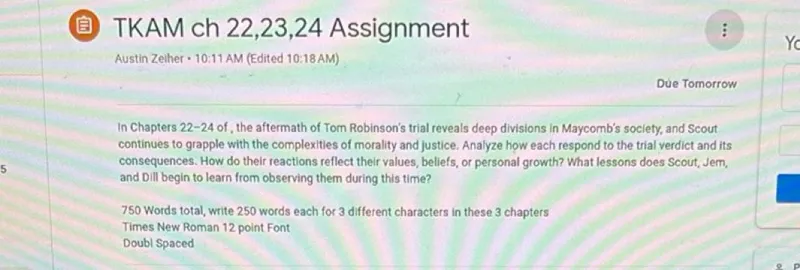Certainly! Let's analyze the reactions of Scout, Jem, and Dill to the trial verdict and its consequences in Chapters 22-24 of "To Kill a Mockingbird" by Harper Lee.
Scout Finch, the young protagonist, is still in the process of understanding the complexities of morality and justice. After the trial, Scout is exposed to the harsh realities of racial prejudice and injustice in Maycomb. Her reaction to the verdict is one of confusion and disappointment. She struggles to comprehend why the jury would convict Tom Robinson despite the clear evidence of his innocence. This experience is pivotal in her moral development, as she begins to see the world beyond her childhood innocence.
Scout's values are shaped by her father, Atticus Finch, who embodies integrity and fairness. Through his example, Scout learns the importance of empathy and understanding others, even when their actions are unjust. The trial teaches her that the world is not always fair, but it is crucial to stand up for what is right. Scout's growth is evident as she starts to question societal norms and the ingrained racism in her community.
Jem Finch, Scout's older brother, experiences a profound transformation following the trial. The verdict shatters his belief in justice and fairness, leaving him disillusioned and angry. Jem had hoped that the evidence presented by Atticus would lead to Tom Robinson's acquittal, but the reality of racial bias in the legal system is a harsh lesson for him.
Jem's reaction reflects his growing understanding of the complexities of human nature and societal injustice. He begins to grapple with the idea that people are not always good or fair, and this realization is a significant step in his maturation. Jem's values are deeply influenced by Atticus, and he learns the importance of fighting against injustice, even when the odds are stacked against him. This period marks a turning point in Jem's life, as he transitions from childhood innocence to a more nuanced understanding of the world.
Dill Harris, the friend of Scout and Jem, is deeply affected by the trial and its outcome. Dill's reaction is one of emotional distress; he is unable to comprehend the cruelty and unfairness of the verdict. His sensitivity to the injustice faced by Tom Robinson highlights his compassionate nature and his belief in the inherent goodness of people.
Dill's experience during the trial serves as a catalyst for his personal growth. He learns that the world can be unjust and that people can be prejudiced. Despite his young age, Dill begins to understand the importance of empathy and standing up for what is right. His friendship with Scout and Jem, along with the influence of Atticus, helps him navigate these complex emotions and develop a more mature perspective on morality and justice.
In conclusion, the aftermath of Tom Robinson's trial serves as a critical moment for Scout, Jem, and Dill, shaping their values and beliefs. Each character responds to the verdict in a way that reflects their personal growth and understanding of the world. Through their experiences, they learn important lessons about empathy, justice, and the importance of standing up against prejudice.






